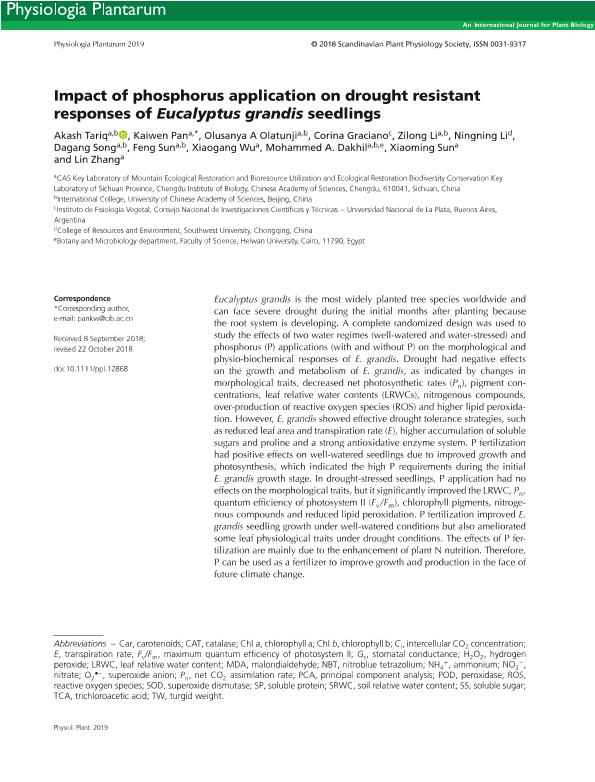Mostrar el registro sencillo del ítem
dc.contributor.author
Tariq, Akash
dc.contributor.author
Pan, Kaiwen
dc.contributor.author
Olatunji, Olusanya A
dc.contributor.author
Graciano, Corina

dc.contributor.author
Li, Zilong
dc.contributor.author
Li, Ningning
dc.contributor.author
Song, Dagang
dc.contributor.author
Sun, Feng
dc.contributor.author
Wu, Xiaogang
dc.contributor.author
Dakhil, Mohammed A.
dc.contributor.author
Sun, Xiaoming
dc.contributor.author
Zhang, Lin
dc.date.available
2022-02-15T19:26:12Z
dc.date.issued
2019-08
dc.identifier.citation
Tariq, Akash; Pan, Kaiwen; Olatunji, Olusanya A; Graciano, Corina; Li, Zilong; et al.; Impact of phosphorus application on drought resistant responses of Eucalyptus grandis seedlings; Wiley Blackwell Publishing, Inc; Physiologia Plantarum; 166; 4; 8-2019; 894-908
dc.identifier.issn
0031-9317
dc.identifier.uri
http://hdl.handle.net/11336/152054
dc.description.abstract
Eucalyptus grandis is the most widely planted tree species worldwide and can face severe drought during the initial months after planting because the root system is developing. A complete randomized design was used to study the effects of two water regimes (well-watered and water-stressed) and phosphorus (P) applications (with and without P) on the morphological and physio-biochemical responses of E. grandis. Drought had negative effects on the growth and metabolism of E. grandis, as indicated by changes in morphological traits, decreased net photosynthetic rates (Pn), pigment concentrations, leaf relative water contents (LRWCs), nitrogenous compounds, over-production of reactive oxygen species (ROS) and higher lipid peroxidation. However, E. grandis showed effective drought tolerance strategies, such as reduced leaf area and transpiration rate (E), higher accumulation of soluble sugars and proline and a strong antioxidative enzyme system. P fertilization had positive effects on well-watered seedlings due to improved growth and photosynthesis, which indicated the high P requirements during the initial E. grandis growth stage. In drought-stressed seedlings, P application had no effects on the morphological traits, but it significantly improved the LRWC, Pn, quantum efficiency of photosystem II (Fv/Fm), chlorophyll pigments, nitrogenous compounds and reduced lipid peroxidation. P fertilization improved E. grandis seedling growth under well-watered conditions but also ameliorated some leaf physiological traits under drought conditions. The effects of P fertilization are mainly due to the enhancement of plant N nutrition. Therefore, P can be used as a fertilizer to improve growth and production in the face of future climate change.
dc.format
application/pdf
dc.language.iso
eng
dc.publisher
Wiley Blackwell Publishing, Inc

dc.rights
info:eu-repo/semantics/openAccess
dc.rights.uri
https://creativecommons.org/licenses/by-nc-sa/2.5/ar/
dc.subject
Drought
dc.subject
Eucalyptus Grandis
dc.subject
Phosphorous Fertilization
dc.subject
Drought Tolerance
dc.subject
Climate Change
dc.subject.classification
Silvicultura

dc.subject.classification
Agricultura, Silvicultura y Pesca

dc.subject.classification
CIENCIAS AGRÍCOLAS

dc.title
Impact of phosphorus application on drought resistant responses of Eucalyptus grandis seedlings
dc.type
info:eu-repo/semantics/article
dc.type
info:ar-repo/semantics/artículo
dc.type
info:eu-repo/semantics/publishedVersion
dc.date.updated
2020-12-09T20:17:24Z
dc.identifier.eissn
1399-3054
dc.journal.volume
166
dc.journal.number
4
dc.journal.pagination
894-908
dc.journal.pais
Reino Unido

dc.journal.ciudad
Londres
dc.description.fil
Fil: Tariq, Akash. Chinese Academy of Sciences; República de China. University of Chinese Academy of Sciences; China
dc.description.fil
Fil: Pan, Kaiwen. Chinese Academy of Sciences; República de China
dc.description.fil
Fil: Olatunji, Olusanya A. Chinese Academy of Sciences; República de China. University of Chinese Academy of Sciences; China
dc.description.fil
Fil: Graciano, Corina. Consejo Nacional de Investigaciones Científicas y Técnicas. Centro Científico Tecnológico Conicet - La Plata. Instituto de Fisiología Vegetal. Universidad Nacional de La Plata. Facultad de Ciencias Naturales y Museo. Instituto de Fisiología Vegetal; Argentina
dc.description.fil
Fil: Li, Zilong. Chinese Academy of Sciences; República de China. University of Chinese Academy of Sciences; China
dc.description.fil
Fil: Li, Ningning. Southwest University; China
dc.description.fil
Fil: Song, Dagang. Chinese Academy of Sciences; República de China. University of Chinese Academy of Sciences; China
dc.description.fil
Fil: Sun, Feng. Chinese Academy of Sciences; República de China. University of Chinese Academy of Sciences; China
dc.description.fil
Fil: Wu, Xiaogang. Chinese Academy of Sciences; República de China
dc.description.fil
Fil: Dakhil, Mohammed A.. Chinese Academy of Sciences; República de China. University of Chinese Academy of Sciences; China. Helwan University; Egipto
dc.description.fil
Fil: Sun, Xiaoming. Chinese Academy of Sciences; República de China
dc.description.fil
Fil: Zhang, Lin. Chinese Academy of Sciences; República de China
dc.journal.title
Physiologia Plantarum

dc.relation.alternativeid
info:eu-repo/semantics/altIdentifier/url/http://doi.wiley.com/10.1111/ppl.12868
dc.relation.alternativeid
info:eu-repo/semantics/altIdentifier/doi/http://dx.doi.org/10.1111/ppl.12868
Archivos asociados
